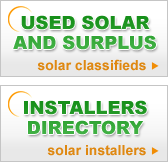
|
Texas residential solar energy incentivesRenewable Energy Systems Property Tax Exemption The amount of the appraised property value that arises from the installation or construction of a solar or wind-powered energy system or device is allowed to be tax exempted by the Texas tax code. An “Exemption Application for Solar or Wind-Powered Energy
Devices” form must be filled out by those who wish to claim
this exemption. Green Mountain Energy Renewable Rewards Buy-Back Program This program is available to residential customers of Green Mountain Energy Company who purchase electricity under the company's Renewable Rewards product. The arrangement requires the customer to enter into an interconnection agreement with their electric distribution utility (not Green Mountain). The customer must work with their utility to install a meter capable of separately measuring the flow of electricity in both directions. Solar energy systems are eligible for incentives under this program. The program supports systems of 25 kilowatts or less. The Renewable Rewards Buy-Back program is similar to net metering. The customer pays Green Mountain the retail rate charged under program for all the electricity they consume from the grid during a month. Any excess energy produced by the customer’s system that is exported to the grid (NEG) is metered separately and the customer's account is credited the following month for the exported energy up to 500 kilowatt-hours (kWh) per month at the retail rate. Renewable Rewards retail rate is the first 500 kWh per month. Utility Rebate Programs The state of Texas has many utility rebate programs available for municipal residents and customers provided by specific utility companies. Details and requirements for each program will vary Information and details on all the different programs are available on the internet. Most of the rebate programs are for Solar PV and Solar water heating systems. Photovoltaic incentives are typically determined by a per-watt
AC basis. Net Metering Austin Energy will provide net metering for customers with solar systems. Any net excess generation at the end of each month will be credited to the following month's bill. The credit will be less than retail value and will be calculated by multiplying the net kilowatt-hours (kWh) of electricity fed into the grid times the current fuel charge. Residential Renewable Energy Tax Credit This personal tax credit allows the taxpayer to claim a credit of 30% of expenditures including labor costs and installation of qualified residential solar-electric systems, solar water heating systems or fuel cells. Small wind-energy systems and geothermal heat pumps can also be accredited for. Solar-electric systems and solar water heaters have a maximum incentive of $2,000 if placed in service before 2009. There is no maximum incentive for systems placed after 2008. The excess amount of the federal tax credit may be carried forward to the next taxable year if it exceeds tax liability. This can be carried forward until 2016, but after that, it is unknown if the unused credit will be able to be forwarded. Residential Energy Conservation Subsidy Exclusion This is a personal exemption of 100% of energy conservation subsidies provided by public utilities. The value of a purchase or installation of any energy conservation measure by a customer such as solar water heat, solar space heat or photovoltaics will not be included in the customer’s gross income. Customers of an electric utility company, who participate in
the utility’s energy conservation program, may receive a rate
reduction of electricity furnished or a nonrefundable credit against
the purchase price of the electricity on each monthly electric bill. Energy-Efficient Mortgages This is a federal loan program where homeowners can use EEM (energy-efficient mortgages) to finance renewable energy technologies in a home.  |







